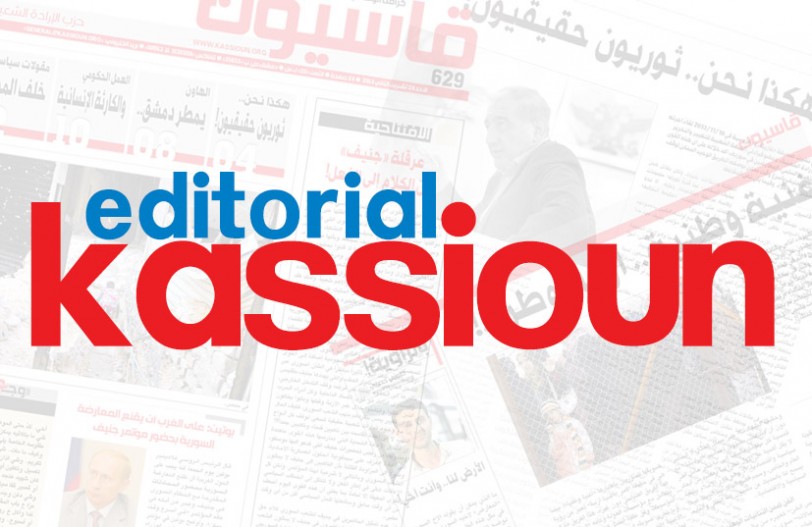- Editorials
- Posted
Combating Terrorism and Pre-Geneva Repositioning
The common element in the declared statements by the different international, regional and domestic parties involved in the Syrian crisis is the talk about the necessity of sorting out a political solution for it. Most of these parties add another talk about the necessity for combating terrorism that exists in Syria or might be started out of the Syrian territories to the outside world.
The price Syria has paid so far for these same parties to reach the first conclusion has been almost three years of real huge and catastrophic human, economic political and social bleed out. However, such declarations on the political solution do not necessarily mean that those parties would be honest and serious in looking for it, nor do it logically indicate that they have a common understanding, neither of the needed solution, nor- in the second conclusion- of the concept of Terrorism, or of how to realize its radical and true eradication.
To link this concretely, the approval to attend Geneva-2 and making it a success, that's looking for «national compromises» away from the mentality of sharing bites and bits of the cake, have turned to be the polygraph of the real intentions of the different parties behind sloganeering «Combating Terrorism».
The simple analysis of some positions shows the distance that still separates between the Syrian people along with their sufferings and the conflict among the different wills, until the convening of the first session of Geneva-2, due in next January. Those wills do diminish or neglect one or two of the three components of the crisis solution, or they simply overturn their order and sequence that basically guarantee their integration: halting external intervention of any form, stopping violence by any party, and launching the political process with all its subtitles.
Now, there are terrorist organizations working in Syria that are in the first place uninterested neither in going to Geneva, nor in forging the political solution out; and they will continue with their practices. Al-Nusra and the ISIS, whose majorities are non-Syrian at least in their leaderships, are and would always be hostile organizations to the interests of the Syrian people as well as those of the nations of the region and the world, as they represent the interests of Neo-Fascism or the reign of the most reactionary and criminal international financial capital, and they are receiving the attention, protection and directions of the hardliners of the capitalist-crisis-hit imperialist centers in the world.
There are, as well, "formal" positions by some Syrian armed groups, the FSA in particular, that reject joining Geneva, and hence whether consciously and willingly or not, placing themselves within the ranks of those supporting the continuation of violence and terrorism in Syria. These groups enjoy the political cover of certain Syrian forces that are doomed to decline and are classified as "external opposition" (the SNA and SNC), which have declared recently that they will go to Geneva, but paradoxically keep to their preconditioning mentality that shrinks the Syrian issue into what they call the interim body, and stipulating who should be included in it and who should not. This logic means at the end of the day that those forces do not actually support the political solution in Syria, rather they back the continuation of external intervention, violence and terrorism as their helping tools in realizing their own political goals, restricted to «assuming power».
In parallel, some groups affiliated to the FSA express their readiness to join a political solution, but their problem lies in "what are the guarantees?", that is their lack of confidence with the regime. This declaration, however, refers to a new transformation and a new alignment, that the hardliners of regime insist on ignoring.
On the other hand, the Syrian regime raises and focuses on «combating terrorism», but it only relates the slogan to stopping external intervention and to «not giving power up», in a way that overshadows its own initiative towards the political solution. The regime abide by this approach despite the fact that the political process should include the formation of a national unity government with real authorities and serious political, socio-economic and democratic agenda in order to radically solve the different aspects of the crisis, i.e., to ensure that it is not going to be reproduced later on. This integrated position, expressed by some «internal opposition forces», runs in line with and serve the real interests of the Syrian people.
The approaches of some friendly countries to Syria, such as Russia, reflect this needed combination of both the deep-rooted solution of the crisis and the fighting of terrorism and its tools due to the international threat they pose. Meanwhile, and contrary to their stated approval to join Geneva, some regional players, such as Qatar and Saudi Arabia, are working on forming new armed formations in Syria- The Islamic Front, that has a Muslim Brotherhood structure, ISIS practices and a liberal agenda, politically and economically. This new organization is meant tactically to be a «power guarantee» on Geneva table, and strategically, a dagger that keeps Syria bleeding. This position by such regional players would detonate the political solution in Syria, on one hand, and would make out of them flagrant backers of international terrorism, on the other.
Those interactions and contradictions would only underline once again the necessity for having a decisive popular polarization on comprehensive national bases, away from the current alignments, including those within the different Syrian political powers, in order to form the best streak on Geneva table.
Kassioun Editorial, issue No 631, 8/12/2013


